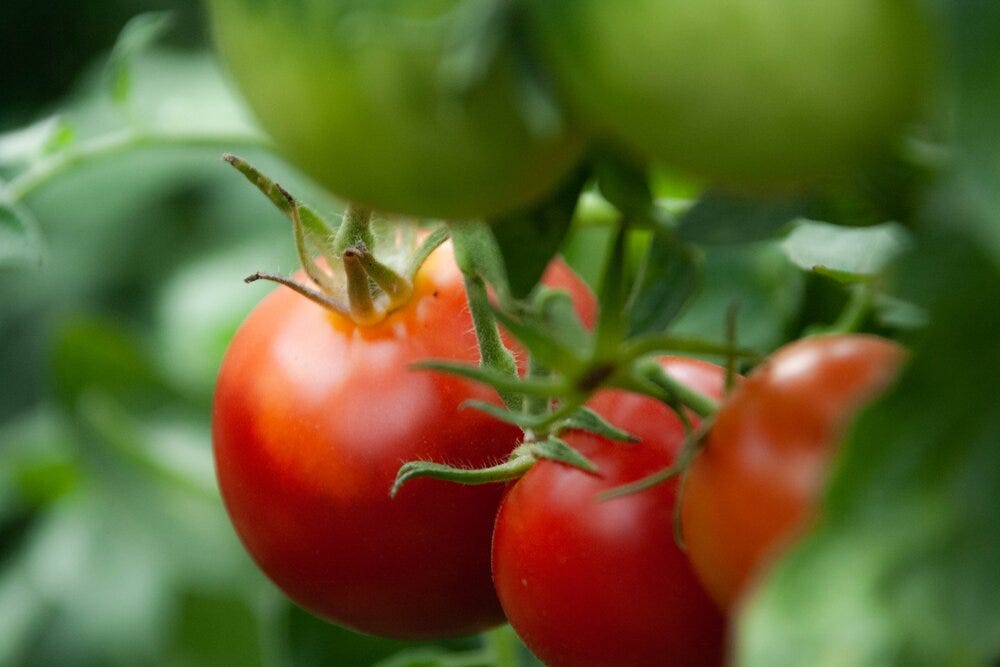Last month we have spent some time at the lake as Minnesotans are supposed to do around this time of the year. When we came back after 10 days our garden had gone wild. The brand new installed automatic sprinklers plus a week of rain (who would have known?!) had transformed our green sanctuary into a jungle. I forgot how fast plants can grow! The broccoli was just a baby plant when we left, and now, look at it, it is as tall as you, I called out in surprise to my little daughter who was running with me through the jungle. And look at the tomato plant! O my, not only had it grown probably three times the size I left it, its branches poured all over the little growing structure which now looked like a dwarf underneath a wild bush with flowers and little green pearls showing here and there.
Now what?
As much I like to let things grow as they please this tomato plant called out to me. It urgently needed help. So we started untangle the branches who had grown around in circles, some broke off while only touching. The poor plant had put a lot of energy into growing around itself putting out more little sprigs every where trying to reach the light. The more it grew wild the more it shaded its own flowers and the less it could concentrate on producing flower buds and fruits.
Untangling the poor thing I thought about cultivating our inner life. Was it time to untangle may be? Is too much energy going into circling around myself than into growing a strong branch into the light? I was quite taken by the lesson the tomatoe plant had in store for me.
Now I had to decide which branch was the strongest and which of the entangled green mass had to go. Some sprigs had turned long and thin, with only a little flower stand at the very end, or even none. All the energy in vain. I nodded. I know. Have those branches, too, I try to comforted the tomato plant. It is not easy to let go of what has become fruitless. Sometimes we need help to get all our well meant attempts untangled, don’t we?
As I ended up pruning the tomato bush back into a tomato plant, cutting off more than half of it, I pondered its lesson: growing wild is not the same as growing strong. Cultivating is work. In the garden as well as in the heart. It needs a kind gardener who carefully and tenderly untangles what has become fruitless and prunes back what needs to go, so the strongest and most healthy part can grow into the light. And produce sweet fruits in its time.
May it be so, in my life, in your life, Amen.






A very special post, even if you don't get the response you deserve. I'll try to keep my response brief (already a bad sign).
This is my 1st experience w/ 1 of your posts, & yes, I'll be subscribing. I also assume you have a religious background, or have I misinterpreted? Either way, your discussion of a "garden" naturally calls to mind the "Garden," a subject I consider myself especially well-versed in. But I'll save that for later.
I was recently visiting my in-laws in Germany, and my father-in-law, distasteful as he is in general, offhandedly revealed that our favorite winery not far away is unique because, in contrast to most, if not all others in the region, they do not cut back their vines. Supposedly, doing so both controls and enhances growth, a subject you've touched on brilliantly here. Unfortunately, as one who has spent little time on a farm, I can't argue either for or against this practice. However, I can argue from a philosophical, religious aspect against doing so, and I'm guessing you'll be able to relate.
Adam was a man of the soil, and Cain was a farmer. Both were known for their pride: they both believed themselves special enough to make their own rules. Adam need not heed any of God's edicts (or just the one–not tasting of the Fruit), and Cain thought himself special enough to decide upon his own brother's death date. Such pride puts us above the creatures we judge/ignore/
mistreat/or tend to. What could be more sinful? We turn our backs on our fellow creature & God simultaneously.
It is a proven scientific fact that tending gardens leads to longevity. The world's longest lived communities–see: "Blue Zones"–all have one thing in common: members tend gardens. Sometimes I believe doing so is the first step to getting back to who we were before the Fall, when we were in our rightful place and close to our potential. We are in harmony with our surroundings, neither above nor below. But these ideas are all too philosophical, too far from the ground. Which brings me to the reason I loved your post most:
"I called out in surprise to my little daughter who was running with me through the jungle..."
This line shows how it could be, how it should be. It shows amazement and awe, togetherness, harmony, and peace. It shows joy and love, without the need for any pseudo-intellectual analysis.
My life has become a singular quest to lead people to exactly these kinds of moments.
Bravo, Dr. F.! I'm sold.